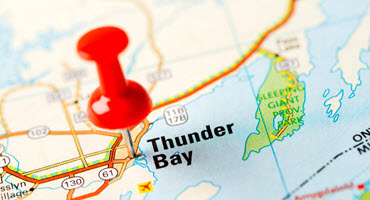Lakehead welcomes farmers to research station
This week, the staff at the Lakehead University Agricultural Research Station (LUARS) invited local farmers and university researchers to tour their outdoor facility and see the new research underway this year.
LUARS staff draw on their expertise, as well as input from university faculty, farmers and graduate students to implement research programming to benefit the local ag industry.
“Every year, we try to bring in new varieties from all over Canada and try to (test them) in Thunder Bay, compared to the standard we have, that the farmers grow already,” Dr. Dr. Tarlok Singh Sahota told Farms.com. He’s LUARS director and a certified crop advisor.
In the 2020 growing season, scientists are trialling new varieties of spring wheat, spring barley, malting barley, oats, canola, soybeans, peas, alfalfa and hops.
“The focus of our research is finding new high-yielding varieties, but also new crops,” Sahota explained. “A new crop doesn’t necessarily mean it is new to Canada, but it is new to our area. For example, canola is a main crop in Canada but, in Thunder Bay, it was not grown. I was the first person to introduce canola to Thunder Bay, and now it’s one of the main crops” in the area.
Local farmers primarily raise livestock. So, they mostly used to grow hay and forages for their animals, he said. Producers grew few cash crops. The research station has helped to increase the diversity of crops raised on in the area.
Farmers in Thunder Bay face different challenges, such as acidic soils, than farmers in southern Ontario, Sahota explained. Growers often need to apply agricultural lime to their fields.
“Compared to southern Ontario, the major difference is that we have a short growing season,” he added. “But the plus side is that we have longer days and cooler nights, which are good for the yield and quality of the crop.”
Short-season crop varieties can achieve high yields in northern Ontario.
“That high yield potential has to be managed properly,” Sahota said. So, researchers also focus on nutrient management, and testing new fertilizers and biostimulants in field trials.
“Unless we have three years of data, we don’t recommend anything to farmers,” Sahota added.
LUARS has a close relationship with farmers in the area. The Ontario Ministry of Agriculture, Food and Rural Affairs founded the station in 1991, and the University of Guelph (Kemptville College) managed the station until 2002. Since then, the non-profit Thunder Bay Agricultural Research Association has run LUARS.
“Farmers managed the station from 2013 to 2017, and it came almost to closure,” due to funding difficulties, Sahota explained. A consultant suggested aligning the research station with the university to provide some stability.
“Since 2018, we are part of Lakehead University but we maintain those relationships with the farmers,” Sahota said. “I still consult them” when determining research priorities.
The relationship works both ways. Sahota consults local farmers on research plans and says it is his duty to translate research outcomes to producers.
“When I took over the station in 2004, I was told that extension is not the researcher’s job,” he said. “I believe that extension is the researcher’s job. If it doesn’t go to farmers, if the farmers don’t apply that research, that means I’m wasting research dollars.”


